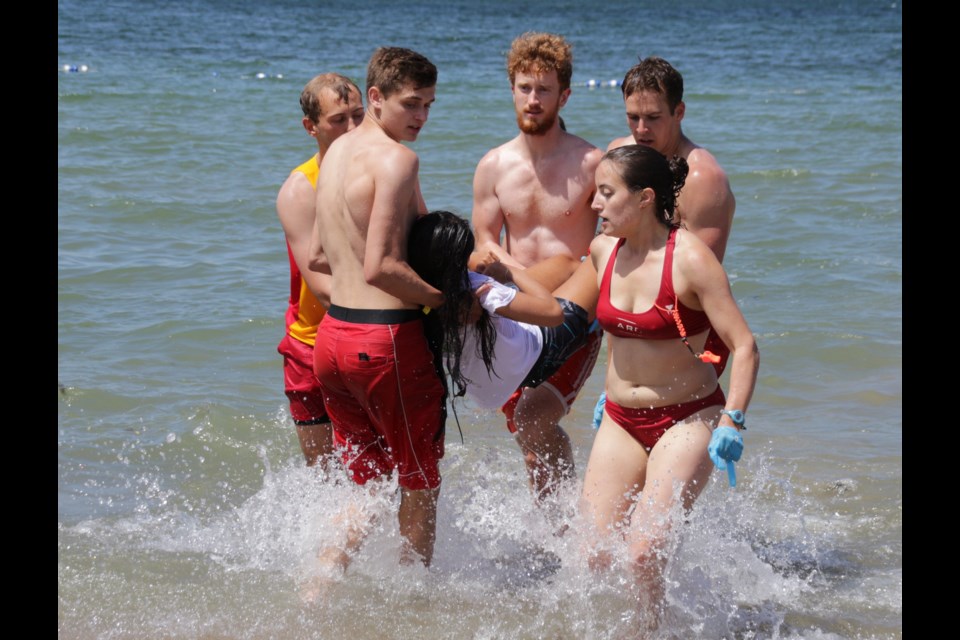Jeremy Head’s lifeguard senses were telling him something was going to happen today.
And it did.
Around 2 p.m., the 18-year-old, who was on duty at Moose Beach, spotted a person out in the water flailing and waving her arms.
Immediately, Head jumped off his perch, blew his whistle, grabbed his surfboard and waded into the water, aiming straight for the kayaker that had fallen over.
“When she fell out, I thought this is something that needs to be taken seriously,” he said. “When I saw her, I went into full lifeguard mode. And I thought this is where I have to take it seriously. I blew my whistle and jumped down.”
Even though Head was taking the situation seriously, it was actually a mock drowning exercise planned by the City of Orillia.
Usually, each beach has four or five lifeguards on duty. Today, Head said he and the other 16 lifeguards at the beach had known this exercise would take place at some point, so he was being extra careful while watching the waters.
Once he had reached the victim, he drew her arms over the surfboard and then expertly flipped the board so she could ride it, while he swam the two to shore.
“She was conscious when I went out and grabbed her, then I knew it was a minor,” said Head, who brought her to the beach, where everyone else was ready to receive the victim.
Head quickly informed everyone around him that she was a minor, and then turned his attention to her.
“She started to say that she'd swallowed a lot of water and her chest was hurting,” he said. “I knew it could get more serious from there, so I called all the lifeguards, which is the procedure we have.”
The training says if one guard can handle it on his/her own, that’s how they should go about it, said Head.
“But as soon as it got to a point where you know the person might be in pain, then I have to signal everyone,” he said.
The response was rapid and smooth; all guards gathered around the victim, each talking to the other about next steps.
Liam Wilson, a supervisor, had already started divvying up tasks, marking the list off in his mind.
“When I saw him going out there, I was thinking of what the next actions would be,” he said, adding some of the duties included who would blow the whistle, who would close the beach, and who would call 911. “Then we had to prepare the beach to receive the victim to give her the first aid that was needed.”
Then a second victim was identified. Everyone quickly sprang into action again.
“When it came to the next victim, we knew that someone was missing,” said Head. “Once that was signaled, some guards stayed with the victim while others were doing deep water and shallow water searches.”
Two guards put on flippers and snorkels and swam from one end to the other searching the deep end of the marked off sections.
A team of eight linked arms and waded the shallow section, looking for the second victim. She was eventually brought in by the aquatics emergency rescue unit.
Both Wilson and Head felt all lifeguards worked together in a seamless way.
“I think it was really good,” said Wilson. “Everyone was organized. Everyone was looking for something to do, which is really important. They all knew what they were doing.”
Even though it was a mock exercise, said Head, he knew he could handle the situation.
“I felt I was really comfortable in the situation, even though it wasn't as serious as it would be if it was real,” he said. “I knew I had to take it seriously and handle it with all the training I have and be calm and confident.”
Sydney Whyte, waterfront director with the city, said she was proud of how her team of lifeguards worked together.
“Our main message (today) is for boating safety,” said Whyte. “Always wear a life jacket whether you're an experienced swimmer or not, especially if you get far out into the water.”
The smoothness of how things went shows their training has paid off, she said.
“The training takes a long time, but it's very well worth it,” said Wilson. “It's a big situation and it's high stakes. These are people's lives and you need to know what you're doing in order to save people's lives.”
